

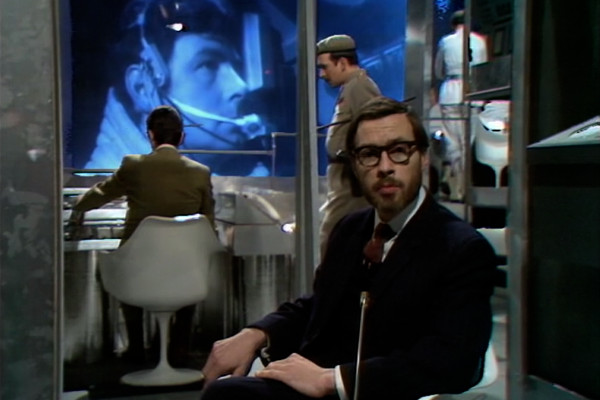
There's perhaps never been a review of The Ambassadors of Death that hasn't said it's overlong at seven parts. And so... it's overlong at seven parts. Six part stories are worthwhile in principle, though rarely meet their full potential. If we take a four-parter as the optimal length for a Doctor Who story, then the occasional six-parter gives us two extra episodes for additional characterisation and depth... in theory. Seven makes the problem even worse.
Such things are not just a personal view, but one actually shared by the production team of the time. While it was cost-saving, with the same sets able to be reused, Barry Letts stated (on The Mind of Evil commentary) that: "Five you could get away with... but, er, six or more was always difficult. Episode five was usually a holding episode [...] the seven-parters we had in my first season were disaster (sic) from that point of view, we had to think of all sorts of tricks to get over it."
It's notable that there were three very fine seven-parters in the 1960s, and three stories that even exceeded this length (including the mammoth twelve-part Daleks' Master Plan), but this was in an age where television was generally slower. Being leisurely-paced was part of the deal; reworking the series into more of an action-orientated set-up isn't easy with the same constraints.
Because of Ambassadors being overlong by at least an episode - and that's being generous - there are some repetitive plotlines to keep things going. Yet there's also more of that leisurely pace, where a rocket to space seems like it's almost travelling in real time. It's a pleasant watch after a long day at work.
It's a strikingly more grounded direction for Doctor Who - particularly if you've never seen Quatermass - and contains some of Malcolm Hulke's moral ambiguity. The Doctor doesn't exist in a world of simplistic morality in Hulke's stories, and he acknowledges that the people he meets are conflicted.
While the new version of the series had a rather juvenile scene with the Doctor punching someone in the face like a street thug and calling them a racist, here the Doctor is confronted by someone who tells him their actions were their "moral duty" and asking him if he understands. The Doctor says "I understand", not agreeing with said actions, but also not having to overtly condemn them to spoon feed the audience at home. It's understated.
Talking of the "audience at home", then one final piece of intrigue for this quite enticing story is that it's the first of three Pertwee tales (followed by The Dæmons and Day of the Daleks) that has events being broadcast by reporters on television.
The screenshot featured above is future Davros Michael Wisher as a newscaster, while perhaps the pick of the three is The Dæmons, which features BBC reporters and staff as preening, fey and egotistical. The odd point of this is that, while interesting, it does slightly undermine Doctor Who's sense of reality, even if the news broadcast in The Dæmons is on the then-fictional BBC3. Because if UNIT can watch a news report on BBC3... what happens if they switched over to BBC1 at a quarter past five on Saturday night?
One last point of trivia... the quality of Season 7 in the archives isn't great. Spearhead From Space, shot on film, exists, preserved, but all seven episodes of Inferno have their colour transferred from NSTC video copies, the original colour PAL videos being wiped. The entirety of The Silurians is a mix of colour transfer and manual colourisation, something also done for episode five of this story. Five other episodes of Ambassadors were colourised using the chroma dot recovery system.
The first episode of The Ambassadors of Death has the distinction of being the only non-Spearhead Season 7 story to still exist in its original format, and the difference is stark. While the efforts done for the DVD and iPlayer releases are commendable, the technology still had constraints, and Ambassadors probably suffers more than the two stories either side of it in picture quality after the first episode plays out. Season 7 has yet to be released onto BluRay at date of writing, and doubtless if/when it is, the restoration will be upgraded.
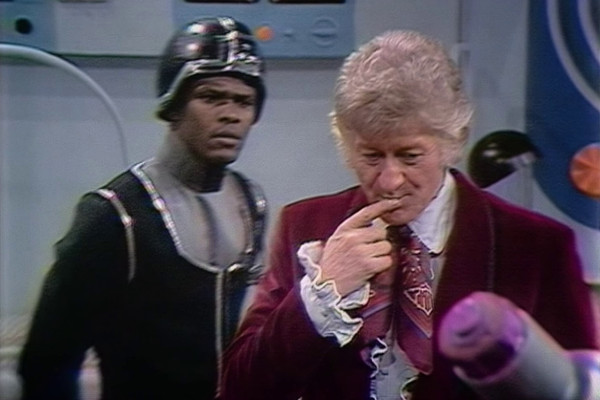
Watching the Pertwee era, it does seem hard to believe that it's not the most expressly political era of Doctor Who. The Mutants makes fairly explicit references to the nature of Apartheid, yet Terrance Dicks insists that the idea was just to tell an exciting story.
Barry Letts also agreed with this assertion, saying in the commentary track to The Curse of Peladon episode four that: "Very, very, very, very, very rarely did we er, have an agenda. Erm, we were just looking for good stories. And good stories arise from situations which will produce good stories."
Both admitted that the sole exception to this was The Green Death, which Barry expressly wrote for an "agenda", and that any other instances were fan theories. One of the stories that Dicks specified was The Monster of Peladon ("No miner's strike"), while Letts did concede that "all these things were in the air [...] they came into writer's minds as ways of finding a good story."
Despite this, neither had an issue with fan theories regarding such things, with Dicks noting that it was "a harmless amusement". So, the subtext of colonialism in The Mutants can be applied to whatever the viewer wishes, be it South Africa or India, and such matters are only to add a flavour to a sci-fi adventure yarn, not the express purpose... maybe.
On the BluRay release there's a featurette looking at the making of the story, where co-writer Bob Baker states: "Dave and I were quite strongly politicised in, in the early ‘70s, as, as er, we were in the kind of ‘60s generation still. [...] I think Dave, particularly, had an interest in the South African Apartheid." Barry Letts also features on the making of, appearing to slightly contradict his remarks elsewhere with: "It wasn't that I decided that we'd have a political show. It was something that Bob Baker and Dave Martin, the Bristol Boys, er, wanted to do."
An imaginative adventure yarn with just enough bizarre moments to keep it from getting dull, The Mutants is rated pretty highly here, almost breaking the top ten, though it's a traditionally unpopular story, usually being comfortably placed in the bottom twenty in fan polls.
One of the most slated elements is actor Rick James, regarded as being wooden by many. Finding information on Rick is hard, partly because he didn't do much work in television (no, leave it) and partly because a famous funk singer shared his name. Rick appeared in two editions of Play For Today and an episode of Dixon of Dock Green, but all three were wiped by the BBC so his performance there cannot be assessed. Only his performance in the Blake's 7 episode "Warlord" can be viewed, and it's... not great. Yet co-writer Bob Baker has stated that the role Rick performs was written to be a Cockney, which was a bad fit with his Caribbean accent. Whatever the truth, it scarcely matters, as, while Rick's... acting... is indeed idiosyncratic, to put it politely, the guy is as charming as a cat playing a fiddle.
Also open to question in this edition is Jon's habit of stroking his mouth with his finger as a shorthand for "thinking"... it reaches its peak with The Mutants, where he does it no less than 17 times. Lastly, those looking for childish amusement may note that Jo makes suspicious-sounding groans in the caves... grow up now, she's clearly just coming round from being unconscious:

There are multiple screenshots I could have taken to show why Inferno deserves to be higher in this list, maybe even top it... but the screenshot above illustrates how it's lucky to get this high.
It's a real mixture of qualities. The Doctor gets to explore a parallel dimension, and there's superb location footage shot by Douglas Camfield. But there's also a cast getting too comfy, giving knowingly "arch" performances as their alternate selves, and the jarring silliness of the Primords.
When humans touch substance brought to the surface by the drilling of the Earth's core, it regresses them. This would be stretching things as it is, but instead of something more suitable, they look like the Scooby Doo and 50p joke shop fangs you can see above. Barry Letts wanted the Primords to be the precursor of homo sapiens, but Douglas Camfield urged for them to resemble werewolves. On the DVD commentary Barry noted that: "I never was able to work out the rationale for that."
The incidental music of Doctor Who was an element that Barry Letts took seriously, and oversaw more electronic music than before. Dudley Simpson was the main composer for the run, crafting 19 of the 24 stories. While not perhaps the most imaginative of the composers, he does a solid enough job, and creates enough diverting moments on the soundtrack.
Carey Blyton provided somewhat eccentric soundtracks to The Silurians and Death to the Daleks, while Malcolm Clarke had an engagingly unique take on music for The Sea Devils. Tristram Cary, arguably the most avant garde composer of the '60s era, makes a return for The Mutants, providing viewers with a very odd mixture of bleeps and blobs for dramatic punctuation.
All of which leads us back to Inferno. During the Troughton era, a third of the stories relied on stock music or no music at all for incidentals. Inferno is the only Pertwee story that uses stock music, which makes it kind of horribly ironic that it's arguably the best of them. As good as Inferno can be, it's really things like Delia Derbyshire's "The Delian Mode" and Brian Hodgson's "Souls in Space" that give the serial so much of its atmosphere.
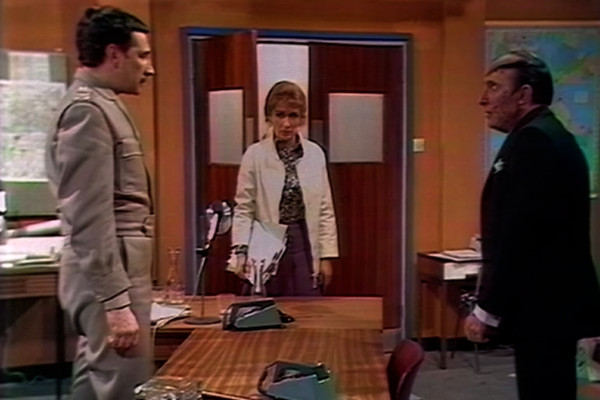
Season 7 is an excellent season of Doctor Who, though it does sometimes have that vague "doing your school homework" feeling. It's a season you might admire rather than love, something that's "worthy" rather than out-and-out entertaining.
One of the most interesting factors is the decision to make the Doctor an abrasive character with limited social skills. Many of the stories could have been resolved in a much easier fashion if they featured a Doctor with, if not diplomacy, then even just a hint of tact.
It's a fresh avenue to go down, a much more subtle take on the "bad Doctor" motif tried to garish effect in the Colin Baker era. The character does get softer from Season 9 onwards, which makes him easier but less interesting to watch. An in-story explanation for this could be that as he's started to travel in space once more (albeit only when the Time Lords allow it) he's losing the frustration of being exiled on Earth.
But watch a story from one of his last two seasons, then put on The Silurians - the difference is staggering. It's the wide gap between a slightly overbearing eccentric and a man who forces you to tread on eggshells lest he bites your head off. However, there is a more "human" feel to Pertwee's Doctor in these early stories, particularly as this and Spearhead From Space both showcase his very human tattoo.
With The Silurians, there are things you have to turn a blind eye to, like the Doctor getting a car with the licence plate "WHO 1", or the actual onscreen title being "Doctor Who and the Silurians". Generally such things are out of place, as it's a serious story, well told.
However, the limitation with Doctor Who when it sets the humour dial down to almost "zero" is that such a dry story struggles to contain unintentional camp. Peter Miles makes the first of three appearances in Doctor Who - followed by Invasion of the Dinosaurs and Tom Baker's Genesis of the Daleks - and he's an actor that's never been told to "give me more" by a director. His death scene is completely over-the-top and threatens to corrode the entire foundation of a very straight-faced story.
Lastly, the ending is very strong, albeit somewhat retroactively undone by The Sea Devils. Despite detractions in this write-up, it's a very good story, and, if anything, ranked perhaps slightly too low.
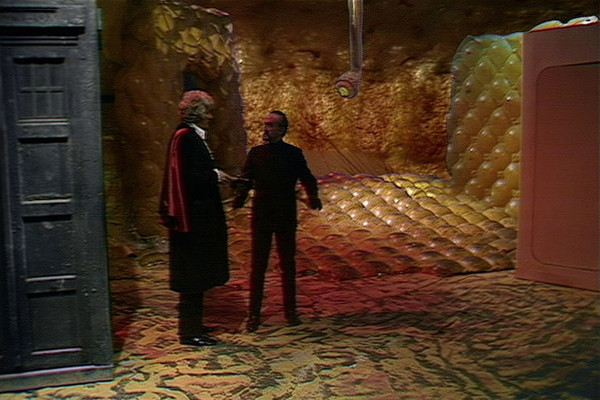
Although the Pertwee era has a fairly consistent stewardship, there is still a certain "apples and oranges" feel to the run. It begins with arguably the most adult Season, before ending with two of the most child-orientated. There's also differences in terms of how "straight" or "humorous" the shows are, and so on.
With this in mind, I decided to draw up an Excel spreadsheet like a complete nerd and compile an average of what each episode rated out of 10. While this is far from a perfect solution - many stories are greater or lesser than the whole - it did give a guideline for a difficult job. Yet what this does mean is that an enjoyable piece of fluff like The Claws of Axos has ranked far higher than I expected it to.
There is a certain "comic book" quality to the Pertwee era as it goes on, in the negative sense of the term, and The Claws of Axos was really the first to veer directly towards pulp sci-fi. Yet despite this, it's possibly the only Doctor Who story ever to cause a nightmare here at The Anorak Zone, with its mix of psychedelic horror remaining in the mind long after the story is over.
Axos was the first story from the partnership of Bob Baker and Dave Martin, who went on to write another seven Doctor Who stories together, including the Pertwee tales The Mutants and The Three Doctors. The real, pure joy in scripts from Baker and Martin is their almost total lack of understanding of Doctor Who's budget. Even with the stories by other writers that work more within Doctor Who's limited financial confines, you can see the show being stretched to breaking point. With Baker and Martin you've got wild ideas, pure imagination, and the quaint charm of seeing their work only semi-convincingly brought to life.
Pertwee's a bit grumpy in this one (there's a great outtake where he complains about people getting in his eyeline) but his very austere attitude and dress sense causes a lot of fans to make the shallow reading of him being the "Tory Doctor", which simply isn't the case. Whereas Troughton's version of the character seemed more bohemian, he was the one who would kill all the monsters, while Pertwee was largely a negotiator. There's talk in Terror of the Autons of the Doctor being with "Tubby Rowlands" "in the club", but I've never believed that this inference is true - it seems to be clearly a blatant lie to silence a civil servant.
Yet any suspicions that the Doctor was voting for Edward Heath during this time seem to be put to rest by his outburst in this story: "My dear Missster Chinn... if I could leave [Earth] I would. If only to get away from people like you. And your petty obsssessionsssss! England for the Englissssh - Good Heavenssssss, man!" "I have a duty to my country." "Not to the world?"
Season 8 is, along with Season 7, one of the two most poorly represented Pertwee seasons in the archives. Although all the episodes exist, many of them did so only as black and white film copies, with the colour versions wiped by the BBC. Some of them were released on VHS with colour taken from inferior NTSC copies, while the increasing sophistication of technology resulted in some being restored for DVD via Chroma dot colour recovery. This enables computers to reconstruct the original colour signal from black-and-white recordings, while some episodes were manually colourised.
The Claws of Axos does better than most, as its first and last episodes remained in the archives in PAL colour videotape, while the middle two were held as NTSC format tapes, which were then converted to PAL - a process which was used for all six episodes of Colony In Space. The only other Season 8 episode to exist in its original PAL colour video was the fourth episode of The Dæmons.
The restoration of such works was okay for the age when they were released on VHS (although The Mind of Evil had to be released on tape in black and white) and got a bit better when they did it for DVD, which appears to be the standard on BBC iPlayer. The BluRay releases take this even further, giving the best restoration yet, though it's still notable that this isn't perfect, particularly on skin tones. Such things aren't meant to sound mean-spirited or churlish; just to note that while we've come an extremely long way in technology, there's still some way to go.
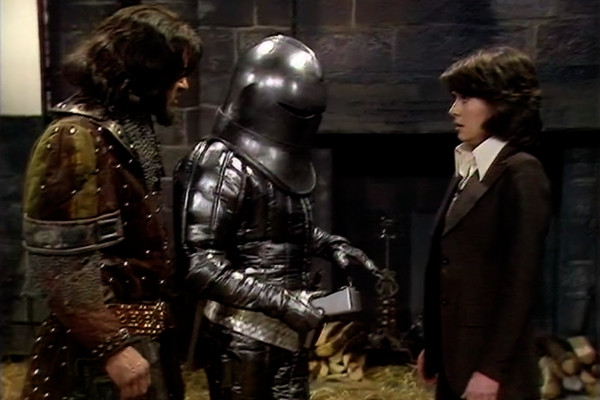
With this story we must return to the idea of original Doctor Who being "fixed" and elements "replaced". The Restoration Team who work on the releases do a good job at cleaning things up, but their habit of replacing elements so they're not "as they were" but "as they could have been" does rather fly in the face of the concept of "restoration".
Sadly, mentioning such things does become regarded as "negative" in the insular world of Doctor Who fandom, and taken as a "personal attack" on the team, rather than just objectively pointing out the obvious. Back when the Team had their own website that published the "fixes", Mark Ayres admitted: "it is a story that I had looked forward to mastering, as I remembered from first transmission how many late-cued background sounds it featured! These have been repaired, along with general noise reduction, dropout and edit repair, theme music replacement and so on. [...] In episodes three and four, some film sequences were very bass-light and thin sounding, possibly due to generator or traffic noise having been filtered in the original mix. I therefore added back in some additional background woodland atmosphere at very low level to give the scenes more body."
Trying to make Doctor Who "polished" is kind of missing the point. Even with the "fixes", then, while the exterior filming looks fine, the studio work for The Time Warrior never looks like anything but an over-lit set. The story is dripping with wit, so it scarcely matters, particularly as it's a semi-comedy, but the idea of adjusting elements to "improve it" is a strangely narrow-sighted way of approaching the programme. But what's important here is that what originally existed is no longer available outside of the archives, and you'd need to go back to the VHS releases to find it.
The second episode of The Time Warrior also sees the Doctor name his home planet for the first time, passed off almost as an aside. Some have criticised the naming of Gallifrey in this way, suggesting that it should have been treated with more fanfare, though this, again, somewhat misses the point. The Doctor already knows the name of his home planet, so for him to state it in a way that suggests mystery or a ground-breaking piece of mythology is to make the Doctor cognisant of his status as a fictional television character. The modern version of Doctor Who is frequently self-aware and full of "trailer speak", where so much dialogue is a portentous warning of "things to come", giving viewers contrived "teasers" rather than focussing on the story at hand.
All of which isn't to say that The Time Warrior isn't very "meta" itself, and there's some great lines, including another sly dig (after Carnival of Monsters) at Jon Pertwee's proboscis: "Is this Doctor a long shank rascal with a mighty nose?" (Although both stories were written by Robert Holmes, Terrance Dicks takes credit for these playful slights in his role as script editor.) There's also the intrigue of Sarah Jane Smith, in her first story, coming to the conclusion that the Doctor is behind kidnapping people in time, and working against him for most of the tale. It makes a refreshing change, probably the first time a companion has mistrusted the Doctor since Ian and Barbara.
(Speaking of Ian Chesterton, then a very sad "RIP" to William Russell, a terrific performer who died just five days before this article was published.)